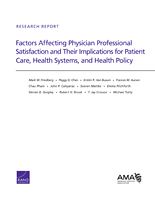| 来源类型 | Research Reports
|
| 规范类型 | 报告
|
| ISBN | 9780833082206
|
| 来源ID | RR-439-AMA
|
| Factors Affecting Physician Professional Satisfaction and Their Implications for Patient Care, Health Systems, and Health Policy |
| Mark W. Friedberg; Peggy G. Chen; Kristin R. Van Busum; Frances Aunon; Chau Pham; John P. Caloyeras; Soeren Mattke; Emma Pitchforth; Denise D. Quigley; Robert H. Brook; et al.
|
| 发表日期 | 2013
|
| 出版年 | 2013
|
| 页码 | 150
|
| 语种 | 英语
|
| 结论 |
The Importance of Delivering High-Quality Care- When physicians perceived themselves as providing high-quality care or their practices as facilitating their delivery of such care, they reported better professional satisfaction.
- Obstacles to such care could originate within the practice (e.g., a practice leadership unsupportive of quality improvement ideas) or could be imposed externally (e.g., payers refusing to cover necessary medical services).
The Pros and Cons of Electronic Health Records- Physicians approved of EHRs in concept and appreciated having better ability to remotely access patient information and improvements in quality of care.
- However, for many physicians, the current state of EHR technology significantly worsened professional satisfaction in multiple ways.
- Aspects of current EHRs that were particularly common sources of dissatisfaction included poor usability, time-consuming data entry, interference with face-to-face patient care, inefficient and less fulfilling work content, inability to exchange health information, and degradation of clinical documentation.
The Value of Income Stability and Fairness- Few physicians reported dissatisfaction with their current levels of income.
- However, physicians reported that income stability was an important contributor to overall professional satisfaction.
- Payment arrangements that were perceived as fair, transparent, and aligned with good patient care enhanced professional satisfaction.
The Cumulative Burden of Regulations- Physicians and practice managers described the cumulative burden of externally imposed rules and regulations as having predominantly negative effects on professional satisfaction.
- At the time of the study, "meaningful use" rules for EHRs were the regulations most commonly singled out by physicians and practice leaders.
|
| 摘要 |
- Physician practices need a knowledge base and resources for internal improvement.
- As physician practices affiliate with large hospitals and health systems, paying attention to professional satisfaction may improve patient care and health system sustainability.
- When implementing new and different payment methodologies, the predictability and perceived fairness of physician incomes will affect professional satisfaction.
- Better EHR usability should be an industrywide priority and a precondition for EHR certification.
- Reducing the cumulative burden of rules and regulations may improve professional satisfaction and enhance physicians' ability to focus on patient care.
|
| 主题 | Health Care Organization and Administration
; Health Care Quality
; Health Information Technology
; Medical Professionals
; Telemedicine
|
| URL | https://www.rand.org/pubs/research_reports/RR439.html
|
| 来源智库 | RAND Corporation (United States)
|
| 资源类型 | 智库出版物
|
| 条目标识符 | http://119.78.100.153/handle/2XGU8XDN/107544
|
推荐引用方式
GB/T 7714 |
Mark W. Friedberg,Peggy G. Chen,Kristin R. Van Busum,et al. Factors Affecting Physician Professional Satisfaction and Their Implications for Patient Care, Health Systems, and Health Policy. 2013.
|
|
文件名:
|
1435330386750.gif
|
|
格式:
|
GIF
|

|
文件名:
|
RAND_RR439.pdf
|
|
格式:
|
Adobe PDF
|
除非特别说明,本系统中所有内容都受版权保护,并保留所有权利。